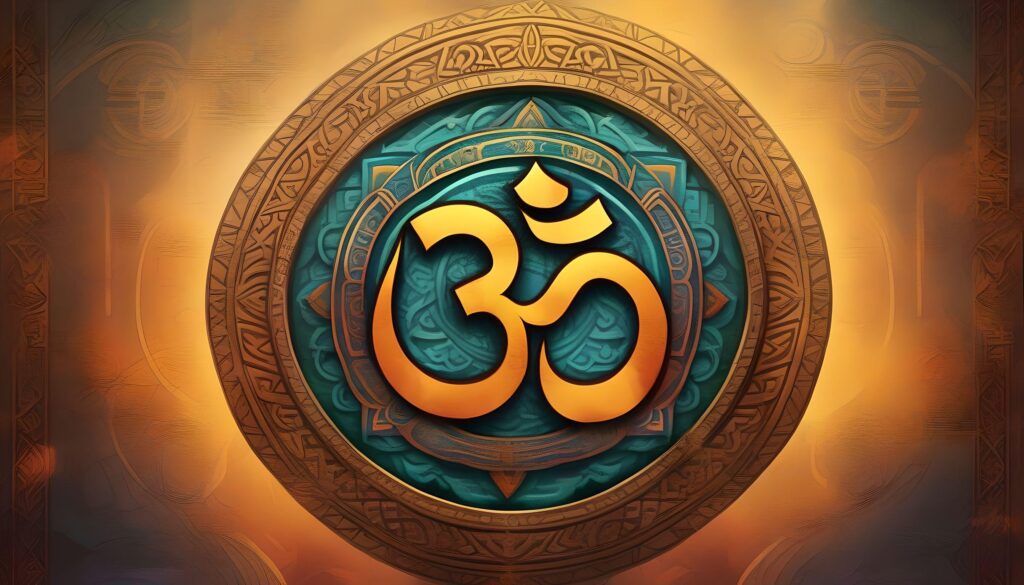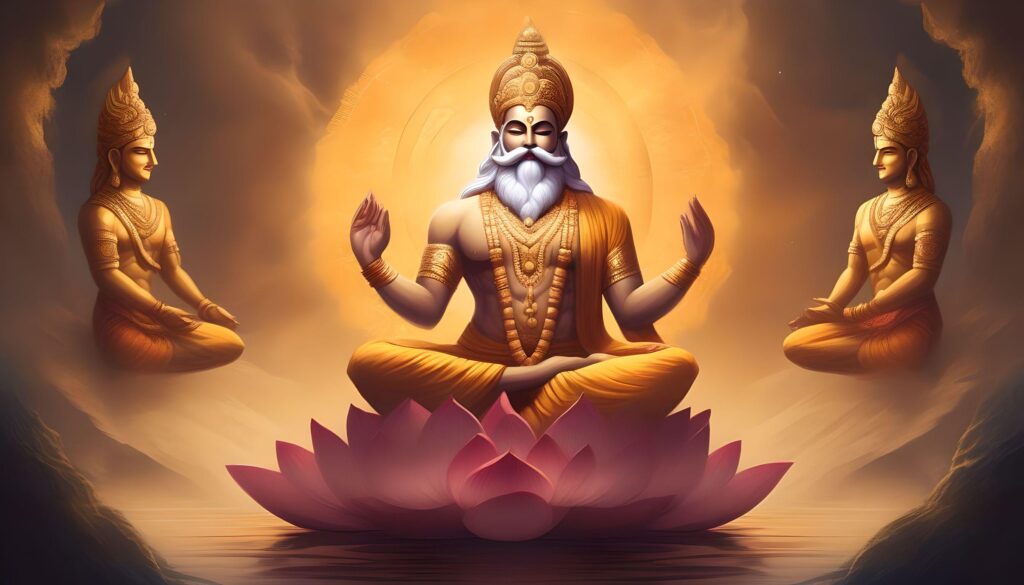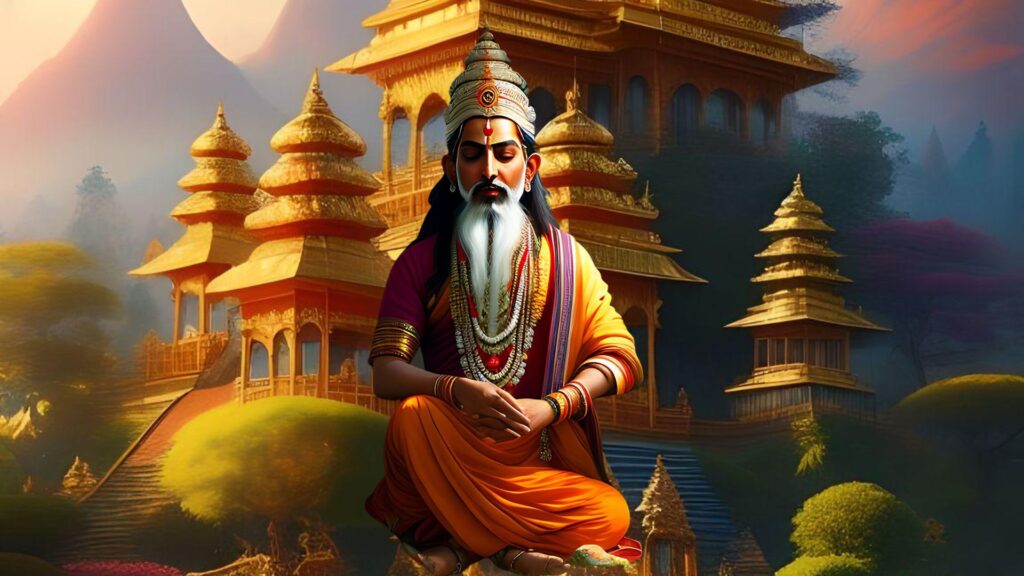karma and dharma in hinduism : Unlocking the Power : Way to life for Spiritual Growth and Personal Fulfillment
Hinduism’s Karma and Dharma: Unlocking the Power: A Pathway to Personal Fulfillment and Spiritual Development Discipline and karma in Hinduism: The Hindu doctrine of karma is a pivotal factor in determining the course of an individual’s existence and ultimate fate. The concept of karma, which originates from the Sanskrit word for “action” or “deed,” pertains to the principle of cause and effect. There is a prevailing belief that each action, encompassing mental, emotional, and physical states, initiates a sequence of occurrences that ultimately ascertain an individual’s forthcoming experiences and results. A comprehensive grasp of karma is essential for acquiring an understanding of the Hindu worldview and the guiding principles of moral and ethical conduct.
The Meaning and Significance of Karma
Karma, in its most basic definition, refers to the cumulative effect of an individual’s deeds and the repercussions that ensue. The concept is frequently encapsulated in the proverb “As you sow, so shall you reap.” This implies that the outcomes one encounters are contingent upon the caliber of their actions. Rewarding positive outcomes is the result of good behavior; conversely, unfavorable consequences follow. Consequently, karma functions as a mechanism of justice, guaranteeing that persons are held responsible for the decisions and deeds they undertake.
Deeply ingrained in the belief of reincarnation, the cycle of birth and death, is the notion of karma. Hindus hold the belief that the eternal self (atman), also known as the soul, is immortal and traverses numerous physical bodies. The events and circumstances of one’s current existence are influenced by the karma accrued in previous lives, while one’s present actions will have a lasting impact on their future lives. Each person bears the responsibility of shaping their own fate by means of their decisions and deeds.
Understanding the Law of Cause and Effect
The principle of karma is predicated on the law of cause and effect, which dictates that each action will result in an equivalent consequence. This principle is applicable beyond the physical domain to encompass the domains of intellect and emotion as well. Each action, thought, and intention produces energy that ultimately materializes in some fashion. This energy can directly influence the life, relationships, and well-being of an individual.
It is imperative to acknowledge that karma encompasses not only the outward repercussions of actions, but also the innermost state of mind and intentions that motivate those actions. Negative karma can still be generated by a virtuous action performed for one’s own benefit, whereas an apparently negative action executed with altruistic intentions can produce favorable outcomes. The fundamental intention and mindset that motivate an action are regarded as pivotal elements in ascertaining its karmic repercussions.
Types of Karma
Karma is divided into three primary categories in Hinduism: prarabdha karma, kriyamana karma, and sanchit karma. Every category symbolizes a distinct facet of a person’s karmic odyssey.
- Sanchit Karma: Unexperienced or unresolved accumulated karma from previous lifetimes is referred to as “sanit karma.” It constitutes the cumulative impact of all deeds, positive and negative, that an individual has executed throughout an infinite number of incarnations. The reservoir of prospective outcomes that may materialize in subsequent lives is referred to as Sanchit karma.
- Prarabdha Karma: A portion of an individual’s sanchit karma that is selected to be experienced in the present existence constitutes praradha karma. It symbolizes the germinated karmic seeds that are presently producing produce. The present life circumstances, opportunities, and obstacles that an individual confronts are all influenced by prarnadha karma.
- Kriyamana Karma: Kriyamana karma, alternatively referred to as agami karma, pertains to the karma that is presently being generated by an individual via their thoughts, words, and deeds. Adding to the sanchit karma is the karma, which has the potential to influence future experiences. Kriyamana karma places significant emphasis on the necessity of exercising deliberate volition and conducting oneself in accordance with one’s personal values and principles.
The Role of Dharma in Karma
Dharma, which is frequently rendered as “obligation” or “virtuousness,” is intricately linked to the notion of karma. A moral and ethical framework is provided by dharma to direct the actions and behaviors of one. It comprises the fundamental obligations, responsibilities, and principles that individuals ought to adhere to so as to coexist harmoniously with themselves, society, and the cosmos.
Dharma functions as an omnipotent influence that directs people toward making decisions that are in accordance with their transcendent goals and promote the welfare of all sentient beings. Individuals have the ability to generate positive karma and establish a virtuous cycle of actions and outcomes by adhering to their dharma. Dharma affords individuals a sense of purpose, direction, and significance in life, enabling them to navigate the intricate challenges of the human condition with lucidity and honesty.
The Three Paths to Liberation
There are three primary routes, referred to as margas, in Hinduism by which one can achieve moksha, or liberation from the cycle of birth and mortality. Karma-marga (the path of action), jnana-marga (the path of knowledge), and bhakti-marga (the path of devotion) are the names given to these routes.
- Karma-Marga: The karma-marga places emphasis on the execution of altruistic deeds devoid of any attachment to the results of said deeds. It promotes the practice of individuals carrying out their social and ethical obligations with a degree of objectivity towards the results. Through the conscientious execution of actions, people have the ability to cleanse their karma and progressively advance in the direction of liberation.
- Jnana-Marga: The jnana-marga places emphasis on attaining self-realization and surpassing the constraints of the ego by means of the quest for wisdom and knowledge. The process entails engaging in profound introspection, investigating one’s own being, and studying sacred scriptures in order to attain a profound comprehension of the intrinsic qualities of oneself and the supreme reality (brahman). By acquiring knowledge, people have the ability to transcend their ignorance and attain an understanding of their intrinsic divinity.
- Bhakti-Marga: The essence of bhakti-marga consists of submission and devotion to a personal deity or manifestation of the divine. The practice entails fostering a profound spiritual and emotional bond with the designated deity via devotional rituals, petitions, and behaviors. Through relinquishing one’s ego and fostering unadulterated love and devotion, one has the potential to attain liberation and experience a profound union with the divine.
The Practice of Dharma and Karma in Everyday Life
Hindus incorporate the principles of dharma and karma into numerous facets of their daily lives. They provide guidance to individuals regarding the formation of meaningful relationships, ethical decision-making, and societal contribution.
- Personal Conduct: Individuals are encouraged to lead a righteous and virtuous existence in accordance with Dharma’s moral principles, which include nonviolence, honesty, integrity, and compassion. It emphasizes the significance of practicing self-discipline, cultivating harmonious relationships, and treating others with respect and dignity.
- Social Responsibility: Individual responsibility to contribute to the welfare of society and the greater good is emphasized in Dharma. It advocates for charitable deeds, community devotion, and the advancement of social justice. Through the conscientious execution of their social obligations, individuals birth positive karma and foster the development of a more benevolent and just society.
- Environmental Stewardship: Dharma recognizes the interdependence of all living things and stresses the importance of exercising responsible environmental stewardship. Hindus are encouraged to practice sustainable living, safeguard the environment, and coexist harmoniously with nature. Individuals contribute to the welfare of future generations and uphold the principles of dharma through their reverence and conservation of the natural world.
The Evolution of Karma and Dharma in Hinduism
Over time, the notions of karma and dharma have undergone transformations and adjustments in response to shifting cultural and social environments. Hinduism has witnessed the emergence of numerous sects, philosophical institutions, and reform movements, all of which have presented distinct interpretations and implementations concerning karma and dharma.
- Bhakti Movements: During the Middle Ages, the bhakti movements emerged, characterized by a profound devotion to and submission to an individual deity. These social movements exalted the bhakti-marga tradition and espoused the value of an intimate and sincere rapport with the divine. The significance of love and devotion in surpassing karma and achieving liberation was underscored.
- Reform Movements: Throughout the modern era of Hinduism, reform movements that sought to revitalize and reinterpret the principles of karma and dharma have emerged. These social movements, including the Arya Samaj and Brahmo Samaj, have endeavored to advocate for social and religious reforms, resolve social injustices, and advance education. Their influence on contemporary Hindu thought and practice has been substantial.
- Global Influence: Hinduism has also gained adherents and influence throughout the globe, extending beyond the Indian subcontinent. Hinduism continues to develop and adjust in response to the influence of various societies and cultures, all the while upholding its fundamental tenets of karma and dharma. The notions of cause and effect, moral obligation, and the quest for emancipation strike a chord with those in search of spiritual gratification and individual development.
Conclusion
Dharma and karma are fundamental components of Hinduism’s spiritual philosophy and practice. A framework is offered to facilitate comprehension of the interrelation between actions, their repercussions, and individual accountability. Through the practice of harmonizing one’s deeds with dharma and fostering positive karma, people are able to effectively navigate the intricacies of existence, make meaningful contributions to the collective welfare, and ultimately strive for liberation from the recurring pattern of mortality. Dharma and karma persistently influence the convictions and way of life of millions of Hindus across the globe, providing counsel and motivation in the quest for spiritual enlightenment and self-realization.









